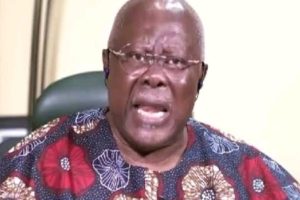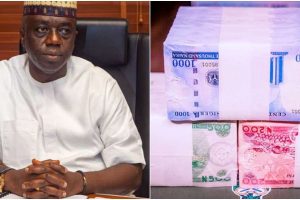
Senator Ali Ndume, representing Borno South, has expressed his frustration with the leadership of the All Progressives Congress (APC), revealing that he would be willing to leave the ruling party if the leadership permits him.
He made this statement during a recent appearance on Channels Television, where he discussed his grievances with the proposed tax reform bills from President Bola Tinubu’s administration.
Although Ndume admitted that he had contemplated leaving the APC for some time, he chose to remain due to his personal relationship with President Tinubu and his desire to see the president succeed. He explained, “I am very close to Tinubu. I don’t want him to fail, and that is why I am taking some of these insults. If not, look, I can leave the party.” This remark reflects the senator’s dissatisfaction with the current state of affairs within the party, particularly after his removal as the Senate Chief Whip in July.
Ndume’s Removal as Senate Chief Whip
Ndume’s removal from his position as Senate Chief Whip followed a letter from APC national leaders, including the party’s national chairman, Abdullahi Ganduje, and national secretary, Basiru Ajibola. The letter cited an interview in which Ndume criticized President Tinubu’s administration. As a result, the party leadership recommended that the Senate relieve him of his duties. Furthermore, the APC advised Ndume to leave the party if he wished to continue criticizing the president, prompting him to apologize and pledge not to publicly criticize the administration again.
Concerns Over Tax Reform Bills
During his interview, Ndume expressed his strong disapproval of the tax reform bills proposed by the president. He described the proposed bills as a case of “giving somebody something with the right hand and taking it back with the left hand.” According to Ndume, the reforms could have a negative impact on Nigerians, especially the poor and middle class. He argued that higher taxes on companies could result in increased prices for goods and services, making life more difficult for the general population.
The senator questioned the fairness of the proposed reforms, particularly the VAT exemption for those earning less than ₦800,000 annually. He pointed out the potential loopholes in the system, such as how people in that income bracket would still be affected by VAT on everyday goods. He further highlighted the risk that companies, particularly large corporations like Dangote Industries, would pass on the costs of higher taxes to consumers. “Even today, the price of cement goes up, and that means consumers will have to pay more,” he said. “If you tax Dangote for his refined products, it means he will add that cost to the cost per litre. So, if you’re saying if you’re earning below ₦800,000 you will not pay tax, what about those people that are below that level?”
Professional Feedback on the Bills
Ndume further stated that he had sought the expertise of professionals, including lecturers and experts in taxation, to review the proposed tax bills. According to him, the overwhelming consensus was that the bills, while well-intentioned, were flawed. He shared that even the very lecturers who were promoting the bills acknowledged that while tax reform was necessary, the current proposal was not the right approach. “I have studied this thing. I have given it to the professionals, even the lecturers of those that are promoting it, those people that taught them. I approached some of them and they said, ‘Look, this tax reform is good, it is good to do tax reform but not this one,’” he explained.
Concerns About the Speed of the Bills’ Passage
One of Ndume’s biggest concerns regarding the tax reform bills is the speed at which they were progressing through the Senate. He expressed suspicion over the rush to pass the bills and questioned the hasty legislative action. “Sit down and do it comprehensively and break it down! Why the hurry? There is a big suspicion. Why the hurry? They are in too much of a hurry,” Ndume remarked, raising concerns that the bills might not have been given proper scrutiny.
The Proposed Bills
The four bills being discussed are the Joint Revenue Board of Nigeria (Establishment) Bill, 2024; The Nigeria Revenue Service (Establishment) Bill, 2024; The Nigeria Tax Administration Bill, 2024; and The Nigeria Tax Bill, 2024. These bills aim to overhaul the tax system in Nigeria, with an emphasis on uniformity in tax revenue collection, the elimination of double taxation, and the encouragement of private sector investment in critical industries. The bills also seek to ease the burden on small businesses and offer targeted tax exemptions to boost disposable income for individuals.
On Thursday, the Senate passed the second reading of these bills, after which they were referred to a committee for further review within six weeks. Senate Leader Opeyemi Bamidele, who sponsored the bills, explained that the bills were a crucial step toward reforming Nigeria’s tax system and improving the country’s tax landscape. He noted that the bills would streamline tax collection processes and address long-standing issues in the Nigerian tax administration.
The Path Forward
Despite his concerns, Ndume’s comments suggest that there is room for discussion and potential revisions of the bills. However, he remains firm in his opposition to the current draft and is determined to continue raising awareness about its potential negative consequences for ordinary Nigerians. His stance also reflects a deeper frustration with the direction of the APC, which has led him to question his continued membership in the party.
As the tax reform bills continue to move through the legislative process, Ndume’s opposition highlights the tensions within the APC, where disagreements over policy and governance are beginning to surface. Whether these disagreements will lead to a broader shift within the party remains to be seen, but Ndume’s willingness to publicly challenge both the administration and the leadership of the APC signals a growing discontent that could have implications for the party’s unity moving forward.





